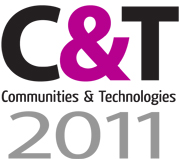Understanding the Implications of Networked Social Interactions for the Design of Public Urban Spaces
Abstract
The study will explore the changing nature of ‘third places,’ that is, not home, not work, but other places where people socialise and connect. It will do so initially within a spectrum of conceptual influences: culture, technological change, risk perceptions, law and legalities, ideology, customs, historic realities, geographic and climatic conditions. The study will consider the differences or changing nature of the use and value of third places in light of changing technology. The insights will inform the ways we design, and involve or engage the community in the development and ongoing use of these spaces. Previous research has considered the ‘third place’ created by technology online and ‘third place’ as a physical space, but the two interacting within the current Australian context has not been the subject of rigorous research yet. There are potential implications in terms of urban sociology and urban informatics and the way we use and relate to our urban environments and connect to our community. Questions are raised in terms of how best can urban planning, future media and communication development and social policy respond to these changes.
Research Questions
- How does the concept of third place fit within the current urban and technological context, how do people value physical space for this connection?
- What differences are there in value, use, expectation and preferences of third places between age groups within different urban environments of Brisbane and South East Queensland?
Research Objectives
- To decipher the relevant factors influencing the choices of third places in contemporary Australian culture, specifically in Brisbane and South East Queensland.
- To consider how people of different ages use and relate to third places in the Brisbane and South East Queensland context.
- To consider the impact of technology and new media on the experience of third place.
- To consider the effectiveness of third places to assist with local social and community development
Team
- Kirralie Houghton (PhD Candidate)
- Assoc. Prof. Marcus Foth (Principal Supervisor)
- Dr Evonne Miller (Associate Supervisor)
Publications
Schroeter, R., & Houghton, K. (2011, Mar 6-9). Neo-planning: Location-based social media to engage Australia’s new digital locals. In Proceedings of the Planning Institute of Australia National Conference 2011. Hobart, Australia. (eprints >)
Houghton, K. (2010, Nov 10-12). Augmenting public urban spaces: The impact of the digital future on the design of public urban spaces. In Proceedings of the Planning Institute of Australia Queensland State Conference 2011. Hyatt Resort, Coolum, Queensland. (eprints >)
Houghton, K., Foth, M., & Hearn, G. (2010, Oct 29-31). Creativity, Knowledge, Engagement: Keys to Finding the Right Governance Model for a Regional Community Precinct. In J. Geelhaar, F. Eckardt, B. Rudolf, S. Zierold, & M. Markert (Eds.), MediaCity 2010: Interaction of Architecture, Media and Social Phenomena (pp. 211-232). Weimar, Germany: Bauhaus University Weimar. (eprints >)


